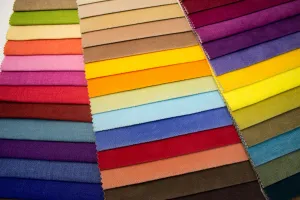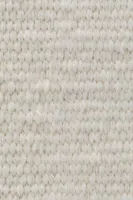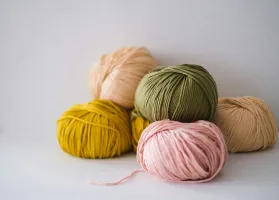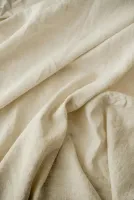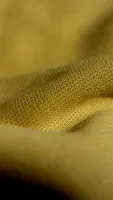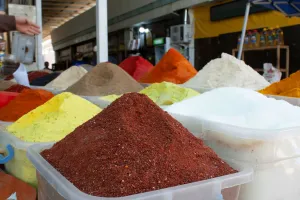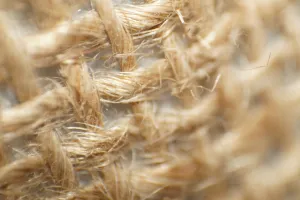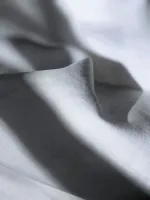Hira Lall & Son (I) Anupam Private Limited is a reputable company based in India, specializing in manufacturing, processing, and packing of home textiles. With a focus on embroidery, embellishment, and organic cotton products, the company offers a range of high-quality pillows, bed sheets, and cushions. Their commitment to using organic materials and sustainable practices sets them apart in the industry. The company's mission is to provide customers with premium home textile products that are not only aesthetically pleasing but also environmentally friendly. Their strengths lie in their attention to detail, quality craftsmanship, and dedication to using organic cotton to promote sustainability. Hira Lall & Son (I) Anupam Private Limited envisions becoming a leader in the home textiles market, known for their eco-friendly and luxurious offerings. Their products cater to individuals and businesses looking for sustainable and stylish home textile solutions. By offering organic cotton products, the company addresses the growing demand for environmentally conscious choices in the textile industry. Hira Lall & Son (I) Anupam Private Limited's services are designed to enhance the comfort and style of homes while also contributing to a greener planet.
Deniz Tekstil . ( CU 810539 ) is a prominent company based in Turkey specializing in textile manufacturing. With a strong focus on quality and innovation, Deniz Tekstil offers a wide range of textile products to both domestic and international markets. Their product line includes fabrics for apparel, home textiles, and industrial applications, showcasing their expertise in the textile industry. Known for their commitment to sustainability and ethical practices, Deniz Tekstil prides itself on producing eco-friendly textiles that meet the highest standards of quality. Their dedication to using cutting-edge technology in their manufacturing processes sets them apart in the industry, ensuring that their products are not only environmentally friendly but also of premium quality. Deniz Tekstil's mission is to provide customers with top-notch textile solutions that not only meet their needs but also exceed their expectations. By offering a diverse range of fabrics and textiles, they cater to a wide range of clients, from fashion designers to industrial manufacturers. Their products are designed to solve specific challenges faced by their target audience, whether it's creating sustainable fashion lines or durable industrial materials. With a vision to lead the textile industry in innovation and sustainability, Deniz Tekstil continues to push boundaries and set new standards for quality and eco-conscious practices. Their textile offerings empower businesses and individuals alike to make environmentally responsible choices without compromising on style or performance. Deniz Tekstil's reputation for excellence in textile manufacturing makes them a trusted partner for those seeking high-quality, sustainable textile solutions.
Brentwood Home stands as a revered leader in the realm of textile craftsmanship, specializing in the art of curating exquisite and opulent home textiles. Firmly anchored in their commitment to sustainability and an unwavering dedication to unparalleled craftsmanship, this distinguished company boasts an extensive repertoire of offerings that encompass a diverse spectrum of home textile products. From sumptuous bedding ensembles that redefine comfort to meticulously designed pillows that cradle you into serene slumber, from mattresses that epitomize support and eco-consciousness to captivating home decor pieces that harmoniously blend aesthetics with function – Brentwood Home is the epitome of refined luxury. At the core of Brentwood Home's philosophy lies a profound veneration for the environment. With a resolute pledge to sustainability, every product is an embodiment of this ethos. Melding the finest materials with artistic finesse, each creation is meticulously conceived to not only provide lavish comfort but also to stand the test of time with enduring durability. The harmonious fusion of opulence and conscientiousness is woven into every thread and intricacy, encapsulating the essence of a lifestyle that is both lavish and mindful. Whether one seeks resplendent bedding sets that envelop them in a cocoon of elegance or desires mattresses that nurture their well-being while embracing the planet's well-being, Brentwood Home is an establishment synonymous with excellence. The company's unyielding devotion to the minutiae of design and the nuances of comfort has earned it an indomitable position within the textile industry. The harmony between intricate detailing and an unwavering commitment to customer satisfaction has not only fortified Brentwood Home's reputation but also solidified its role as a beacon of trust within the realm of textiles. In a world where textiles extend beyond the realm of utility and step into the realm of artistry, Brentwood Home shines as a paragon of innovation, sustainability, and sheer craftsmanship. As patrons of fine living seek to intertwine luxury with responsibility, Brentwood Home stands ready to redefine the very fabric of their existence – where comfort is elevated, aesthetics are redefined, and a healthier, more conscious lifestyle is woven seamlessly into the tapestry of everyday life.
Pardeep Exports is a renowned company based in India, specializing in manufacturing, printing, and weaving within the home textiles industry. With a focus on quality and innovation, Pardeep Exports offers a wide range of home textile products to consumers worldwide. Their expertise lies in creating high-quality textiles that cater to the needs of modern households, ensuring both style and functionality in every product. Known for their commitment to sustainability and excellence, Pardeep Exports prides itself on being a certified supplier with a strong emphasis on eco-friendly practices. Their dedication to using ethical manufacturing processes and materials sets them apart in the industry, making them a trusted choice for environmentally conscious consumers. From bedding to curtains and beyond, Pardeep Exports delivers top-notch home textile solutions that combine style, comfort, and sustainability. Pardeep Exports' mission is to provide customers with premium home textile products that enhance their living spaces while promoting a greener future. By offering a diverse range of textiles that are not only aesthetically pleasing but also environmentally friendly, the company aims to meet the evolving needs of the modern consumer. With a vision to lead the way in sustainable textile manufacturing, Pardeep Exports continues to innovate and expand its product offerings to serve a global audience seeking quality, eco-conscious home goods.
E.M.Ma GbR mudis Naturkissen & mehr is a renowned company based in Germany, specializing in manufacturing and trading home textiles. With a focus on quality and sustainability, the company offers a wide range of products including bed sheets, mattresses for babies, blankets, pillows, and more. Their commitment to eco-friendly practices is evident through their GOTS certification, ensuring that their products meet the highest standards of organic textiles. The company's mission is to provide customers with premium home textile solutions that prioritize comfort, safety, and environmental responsibility. Their dedication to using natural materials and ethical manufacturing processes sets them apart in the industry. E.M.Ma GbR mudis Naturkissen & mehr's vision is to continue innovating in the home textiles sector, offering customers reliable and sustainable products that enhance their living spaces. Through their diverse product range, E.M.Ma GbR mudis Naturkissen & mehr aims to cater to individuals and families seeking high-quality and organic home textile options. Their offerings not only provide comfort and style but also contribute to a healthier and more sustainable lifestyle for their customers. By prioritizing organic materials and responsible production methods, the company ensures that their products benefit both the users and the environment.
Qilu Hongye Textile Group Co., Ltd., known as Qilu Hongye, is situated in Shanghe County, just north of Jinan. Its sprawling campus covers an area of approximately 600,000 square meters, and the company boasts total assets valued at RMB 800 million. Primarily engaged in the textile industry, Qilu Hongye has a production capacity of 300,000 spindles, 3,000 automatic air flow spinning machines, and 1,500 looms. Over the years, the company has consistently demonstrated exceptional business performance, with an annual increase in taxable capacity and substantial contributions to local employment. This has established it as a key player and leader in the local economy, earning various accolades, including recognition as an Advanced Group in the Nation's Textile Industry in 2006, awards from the CPC Jinan Municipal Committee and Jinan Municipal People's Government for several years as an Advanced Unit, and inclusion in Jinan's Top 50 Industrial Enterprises and Top 10 Private Enterprises. Since its inception, Qilu Hongye has adhered to its "Precise, Professional, Strong" ethos, placing an emphasis on producing quality products and providing excellent customer service. The company has been dedicated to establishing Hongye as a renowned brand in the textile industry throughout the country. Through sustained efforts, the company has made significant advancements in its technical capabilities and equipment. They've incorporated world-renowned branded textile components and equipment, such as Swiss Rieter for combers and drawing frames, Germany's Schlafhorst, and Japan's Murata for automatic winders. Additionally, they've introduced two Swiss Fong high-voltage vacuum yarn steaming machines, all of which form the foundation for producing high-quality textiles. In tandem with these technical enhancements, the company has implemented world-class management practices and achieved ISO9001 and ISO14001 certifications. Distinguished by their professionalism, the company has diligently developed and produced top-tier knitting yarns and specialized fiber yarns, yielding notable successes. Their combed and carded yarns ranging from 32S to 60S have earned recognition as National Trustable Excellent Yarn Products by the China Cotton Textile Association and Knitting Association. The 80s, 100s, and 120s combed yarns are the preferred choice for high-end garment and home textile manufacturers. Their pure cotton and blended yarns have been designated as "National Inspection-free Products" and have held the titles of "Shandong Famous Trademark" and "Shandong Famous Brand Products" for several years. Their differentiated fiber products, including Sirospun, compact spinning, and colored spinning products, are widely appreciated for their high quality, consistent performance, appealing style, and exceptional texture. Hongye Group has excelled in identifying opportunities in challenging circumstances and thriving amid crises. Despite the impact of the global financial crisis, they have effectively identified new avenues for growth amid significant changes. The implementation of the Adjustment and Revitalization Plan of the Textile Industry has particularly opened new prospects for textile companies. Leveraging their expertise in producing high-quality cotton weaving yarns and blended colored yarns, Hongye Group has adjusted its product portfolio, swiftly entering the realm of high-tech differentiated textile products. Their refractory protective clothing Aramid fabric received the Third Prize of Science and Technology Progress from Jinan. They have also introduced a range of differentiated multi-blended products with various functions, including chitin fiber, milk fiber, soybean fiber, pearl fiber, bamboo fiber, Tencel, modal, fiber flax, wool, cashmere, stamen, cony hair, acrylic fiber, vinylon, nylon, moisture-absorbing fiber, cation dacron, conductive fiber, and fire-resistant fiber, along with dyed yarns such as cotton, dacron, tencel, and rayon. Concurrently, the company is investing heavily in establishing a new product research and development center, strengthening innovation efforts, optimizing production processes and configurations, and expanding production capacity in new spinning yarns like colored spinning, sirospun, and compact yarn. Notably, they have achieved significant progress in researching and producing special yarns, such as disorderly slubby yarn.
Suvastra India is primarily engaged in manufacturing textile goods, not elsewhere classified, including linen goods, jute goods, felt goods, padding and upholstery filling and processed waste and recovered fibers and flock. This includes processing textile fibers to prepare them for spinning, such as wool scouring and carbonizing and combing and converting tow to top, are also classified here.
Ryan Overseas is primarily engaged in manufacturing house furnishings, such as blankets, bedspreads, sheets, table cloths, towels, and shower curtains from purchased materials.
Konvil Exports is a prominent trading company based in India, specializing in a wide range of products including accessories, hygiene products, fabrics, garments, and home textiles. With a focus on organic materials like cotton and spandex, the company offers a variety of apparel and home goods that cater to the needs of both adults and children. Known for their commitment to quality and sustainability, Konvil Exports prides itself on providing eco-friendly and comfortable products to their customers. The company's mission revolves around promoting organic and sustainable practices in the textile industry while offering a diverse range of products to meet the varying needs of consumers. Konvil Exports excels in producing organic cotton clothing, bedding, and accessories, ensuring that their products are not only fashionable but also environmentally friendly. Their dedication to using organic materials sets them apart in the market and appeals to eco-conscious individuals and families looking for sustainable options. Konvil Exports' strength lies in their ability to combine comfort, style, and sustainability in all their offerings. From organic cotton sweaters and shirts to bedding and towels, the company's products are designed to provide customers with high-quality, eco-friendly alternatives. By prioritizing organic materials and ethical production practices, Konvil Exports aims to make a positive impact on both the industry and the environment. Their vision is to continue expanding their product line while maintaining their commitment to sustainability and customer satisfaction. Through their range of organic cotton products, Konvil Exports addresses the growing demand for sustainable and environmentally friendly options in the textile industry. By offering a variety of clothing, home textiles, and accessories made from organic materials, the company provides customers with the opportunity to make conscious choices that benefit both their well-being and the planet. Konvil Exports' products not only meet the needs of their target audience but also contribute to a more sustainable and ethical fashion and textile industry.
My Home Collections Pvt Ltd is a renowned company based in India, specializing in the manufacturing and processing of home textiles. With a focus on pre-treatments, packing, embroidery, warehousing, and manufacturing, the company offers a wide range of high-quality products in the home textiles category. Certified by ICEA Istituto per la Certificazione Etica e Ambientale, My Home Collections Pvt Ltd is committed to ethical and environmentally friendly practices, ensuring that their products meet the highest standards of certification. The company's mission is to provide customers with premium home textile solutions that combine quality, innovation, and sustainability. Known for their expertise in wet processing and storing, My Home Collections Pvt Ltd caters to a diverse clientele seeking luxurious and eco-conscious home textile products. Their dedication to excellence and adherence to ethical standards set them apart in the industry, making them a trusted choice for consumers looking for top-notch home textile solutions. My Home Collections Pvt Ltd's strengths lie in their attention to detail, commitment to environmental responsibility, and passion for creating exquisite home textile products. Their vision is to revolutionize the home textile industry by offering a wide range of sustainable and stylish products that enhance the comfort and aesthetics of living spaces. From bedding and curtains to towels and upholstery, the company's offerings are designed to elevate the home décor experience while promoting sustainability and ethical practices. By providing GOTS certified home textiles, My Home Collections Pvt Ltd not only meets the needs of environmentally conscious consumers but also contributes to a greener and more sustainable future. Their products are tailored to meet the demands of modern living, offering both style and substance to customers who value quality and ethical sourcing. With a focus on innovation and customer satisfaction, the company's home textile solutions are designed to enrich homes and lifestyles while promoting responsible consumption and production practices.
Textiles and their associated fibers are used widely materials in many industries, from clothing apparel to home decor and upholstery, to automobile interiors. While the industry continues to grow consistently year over year, driven by population growth and increasing demand, the compound annual growth of “sustainable” or “preferred materials” has been even faster. This directory contains up-to-date information on sustainable “Industry” manufacturers and suppliers, allowing users to quickly search through a variety of sustainable textile products and directly contact suppliers and manufacturers for custom capabilities. The directory also includes information on sustainable “Industry” certifications for products and processes, making it easy to identify sustainable material sources that meet evolving industry best practices and s standards.
2. Benefits of Sustainability in the Textile Industry
A. Environmental Benefits
Sustainable fabrics are made from materials that are sustainable and have a much lower environmental impact than traditional fabrics. Benefits include:
-
Lowering the pollution caused by synthetic fibers: Sustainable materials often as low-impact dyes, natural fibers, and sustainable production processes.
-
Require fewer resources: They use fewer resources and create less waste, making them a great choice for environmentally conscious consumers.
-
Durable: Sustainable fabrics also tend to be more durable and last longer, which means they don’t need to be replaced as often. This reduces the amount of fabric waste created by discarded clothing items.
-
Less water consumption: Sustainable fabrics can help reduce water consumption by using technologies such as closed-loop dyeing processes that reuse or recycle all of their water sources.
-
Use less chemicals during production: Sustainable fabrics typically require fewer chemicals during production compared to conventional textiles, resulting in cleaner air and waterways near manufacturing sites.
B. Social Benefits
-
Health benefits: Using sustainable fabrics in textiles limits reducing both consumer and worker exposure to potentially harmful chemicals from dyes and pesticides. In addition, sustainable materials are often made from natural fibers, meaning they do not release microfibers into the environment. This improves air quality by reducing toxins and allergens in the air. Furthermore, sustainable fabrics are typically softer and more comfortable than synthetic materials, making them less likely to cause skin irritation or allergy problems.
-
Supporting local economies: Sustainable textiles support local economies by providing jobs for those who work in sustainable textile manufacturing. Not only does it create employment opportunities, but sustainable fabric production also provides a stable source of income for farmers and communities involved in growing the materials used to make these fabrics. Sustainable fabric production has social benefits due to its ability to promote awareness about environmental issues while reducing negative impacts on global ecosystems. By investing in sustainable fashion products consumers can help support businesses that prioritize sustainability over profits which will ultimately benefit our planet's future generations.
C. Economic Benefits
-
Lower Production Costs: By using sustainable materials and processes, producers can reduce costs associated with producing fabrics. For example, sustainable fabrics such as organic cotton require significantly less water and pesticides in their production process than traditional methods, which over time can lead to amortizable cost savings. In addition, sustainable manufacturing processes reduce energy use and the amount of hazardous chemicals released into the environment, which can also help mitigate contingent liabilities held on the balance sheet as a result of an evolving regulatory landscape.
-
Increased Revenue Opportunities: By using sustainable fabric materials and processes, companies can open themselves up to a whole new market of consumers who are more conscious of their environmental impacts when making purchasing decisions. As years go on, an increasing number of both quantitative and qualitative studies show these consumers are willing to accept a higher markup over the cost of production to accommodate their preferences.
-
Improved Brand Image: Utilizing sustainable materials and processes for fabric production can provide companies with a positive brand image among environmentally conscious customers and organizations that promote sustainability initiatives. This improved public perception helps companies develop stronger relationships with customers, build reputation as an environmentally responsible company and attract new sources of investment capital or financial resources. A growing number of supply chain finance and credit products consider a sustainable score when determining firm risk profiles.
3. Producing Sustainable Fabric
A. Materials & Inputs
I. Natural fibers
-
Organic cotton: Organic cotton is grown without the use of harsh chemicals and pesticides. This conserves water resources and is less damaging to soil health than traditional cotton production. Organic cotton also requires fewer inputs such as synthetic fertilizers, energy for spinning and weaving processes, and other chemicals which can be damaging to the environment.
-
Nettle plant: Ramie is a sustainable fabric with an exceptionally low environmental impact. It is produced from nettle plants that grow in many parts of Asia without the need for irrigation or the addition of fertilizers or other toxic substances. The fiber can be spun into yarns that are naturally resistant to moths, mildew, and bacterial growth—making it an ideal choice for sustainable clothing production.
-
Flax Fibers: Linen is sustainable fabric made from flax fibers that require little water for cultivation. It has several benefits over traditional fabrics as well; linen doesn’t shrink or stretch when wet like cotton, it’s highly absorbent and fast-drying, making it perfect for warm weather garments.
-
Hemp fiber: Hemp has been used as a sustainable resource in many cultures throughout history due to its strength, durability, and anti-bacterial properties. Hemp fiber can be woven into strong textiles requiring little energy input during production processes and producing few if any byproducts that would harm the environment.
-
Soybean plant fiber: Soybean plant fibers are rapidly renewable resources with excellent potential as sustainable textiles due to their softness and nutritious characteristics. Soybean fibers are biodegradable with low energy requirements during processing; they are easy on machinery due to their natural lubrication capabilities; they have excellent breathability compared to other plant-based fibers; plus they can be blended with other sustainable fabrics like wool or hemp for increased comfort levels in garments or home furnishings items such as curtains or bedding sets.
-
Bamboo fibers: Bamboo fibers are derived from pulp cellulose harvested from bamboo forests using sustainable harvesting practices that don't damage the environment in any way shape or form; this makes them perfect candidates for use in sustainable fabrics since no additional inputs such as water or fertilizer are needed during cultivation or harvesting processes. Bamboo fabric is lightweight yet incredibly strong at the same time while also exhibiting antibacterial properties which make them ideal materials for apparel items that need frequent washing cycles like sleepwear or activewear gear sets.
II. Synthetic fibers
Recycled polyester: Recycled polyester derived from post-consumer scraps has become increasingly popular within the sustainable fashion sector due to its versatility: it can be combined with other sustainable materials like organic cotton blends; spun into yarns for weaving durable yet comfortable textiles; used in knits garments like t-shirts sweatshirts etc.; even pressed into felt pieces great for softening up furniture items without adding bulkiness–all without generating additional waste streams nor consuming excessive amounts of resources during production cycles which makes them perfectly suited when looking at more eco-friendly alternatives.
III. Natural dyes
Natural dyes sourced from plants such as indigo, madder root, onion skins, turmeric root, walnut husks, lacquer tree bark extract, etc., are commonly used instead of harsh chemical dyes that can damage both human health and the environment over time.
B. Innovative Technologies
-
Sustainable dyeing is a process in which fabrics are dyed using sustainable methods that do not use harsh chemicals or toxic materials. An example of this is the highly popular "low-impact" dyes, which are naturally derived from plant sources and are much less damaging to the environment.
-
Sustainable weaving techniques involve using sustainable fibers such as organic cotton, bamboo, hemp and other eco-textiles. These sustainable fibers require less energy and resources to produce than traditional fabrics while offering similar qualities. Additionally, some sustainable weaving techniques can reduce waste and conserve water during production.
-
Water conservation is also an important part of sustainable fabric manufacturing processes. Using advanced technologies such as rainwater harvesting, water recycling systems and low-flow technology can reduce the amount of water used for production significantly. Additionally, utilizing efficient irrigation techniques can help conserve a large amount of water over time.
-
Energy efficiency is another area where innovative techniques can be employed in sustainable fabric manufacturing processes. The use of renewable energy sources such as solar power can reduce the amount of electricity required for production significantly. Additionally, utilizing new technologies such as LED lighting systems or advanced heating systems can help reduce energy requirements even further.
4. Examples of sustainable fabrics
-
Organic cotton: Organic cotton is grown without using any synthetic pesticides or fertilizers. Unlike conventional cotton production, organic cotton farming uses sustainable farming methods which respect the environment by minimizing the use of chemicals that are harmful to both the planet and humans. Organic cotton is highly durable and comfortable to wear while also being completely renewable and biodegradable.
-
Hemp: Hemp is a highly sustainable fabric due to its fast-growing capabilities and low resource requirements. It can be grown without fertilizer or pesticides, reducing environmental degradation caused by conventional crop production practices. Hemp also requires less water than other crops and has a low impact on soil health because it fixes nitrogen into the ground as it grows. Hemp fabric is soft yet strong making it an ideal choice for clothing applications as well as furniture upholstery and other home decor items.
-
Bamboo: Bamboo is another sustainable fabric option that offers many benefits including rapidly growing capabilities; it takes just three years for bamboo to reach full maturity compared with twenty-five years for trees! Bamboo requires little irrigation or care when cultivated traditionally; therefore, no synthetic pesticides or fertilizers are required in its production process. This makes it a great sustainable option when looking for fabrics that don’t release wastes into the environment during cultivation process. Bamboo fabric is also lightweight yet strong — perfect for bedding or apparel — and has a luxurious feel to it like silk but without all the negative environmental impacts associated with silk production.
-
Manmade Cellulosic Fibers: Manmade Cellulosic Fibers fabric is a sustainable and eco-friendly textile produced from plant sources like bamboo, hemp, or wood pulp. This versatile material has many characteristics that make it attractive for not just fashion apparel but also home goods, furniture, and other uses. It offers superior performance qualities such as wrinkle resistance, softness, breathability, and sustainability which makes.
-
Recycled polyester: Recycled polyester represents yet another sustainable fabric option since it doesn't require additional resources to be produced like other fabrics do - instead recycled polyester fibers are collected from post-consumer products such as plastic bottles before being converted into yarns used in fashion items like jackets or sweaters. Recycled polyester feels soft against skin while being resilient enough to withstand frequent washing cycles making them ideal for activewear apparel pieces where flexibility is key!
5. Sustainable Textile Standards
-
FAIRTRADE INTERNATIONAL
-
SOIL ASSOCIATION
-
GLOBAL ORGANIC TEXTILE STANDARD
-
OEKO-TEX(R)
-
REPREVE
-
ACO CERTIFICATION LTD
-
NATURLAND
-
FAIR TRADE USA
-
ICEA
-
COTTON USA™
